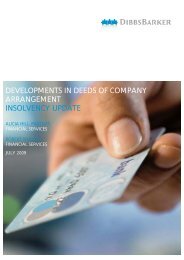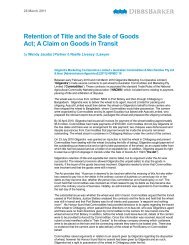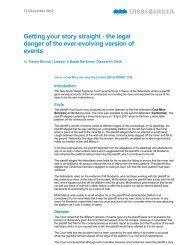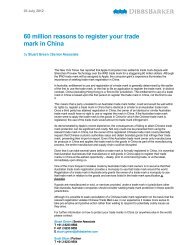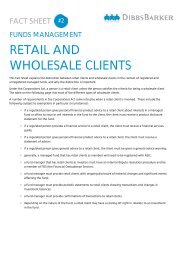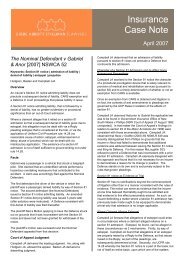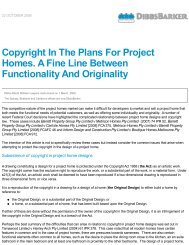What's New in Commonwealth Compensation - DibbsBarker
What's New in Commonwealth Compensation - DibbsBarker
What's New in Commonwealth Compensation - DibbsBarker
You also want an ePaper? Increase the reach of your titles
YUMPU automatically turns print PDFs into web optimized ePapers that Google loves.
There was no dispute that the Applicant suffered from a psychological condition which, on the<br />
medical evidence, the Tribunal found was best characterised as “depressive disorder” which was an<br />
ailment that was contributed to, to a significant degree, by his employment. Therefore the issue<br />
before the Tribunal was whether the ailment was suffered as a result of reasonable adm<strong>in</strong>istrative<br />
action taken <strong>in</strong> a reasonable manner <strong>in</strong> respect of the Applicant’s employment such as to exclude<br />
him from receiv<strong>in</strong>g compensation <strong>in</strong> accordance with s 5A(1) of the Safety, Rehabilitation and<br />
<strong>Compensation</strong> Act 1988 (Cth) (“1988 Act”) because it would not constitute an “<strong>in</strong>jury”.<br />
The Tribunal firstly found that each of the matters raised <strong>in</strong> the Applicant’s claim were actions by<br />
management which <strong>in</strong>volved staff, and that each constituted “adm<strong>in</strong>istrative action” for the purposes<br />
of the 1988 Act. The Applicant alleged that the adm<strong>in</strong>istrative action <strong>in</strong> relation to the three matters<br />
was unreasonable. On the factual evidence before it, the Tribunal found that the adm<strong>in</strong>istrative<br />
action <strong>in</strong>volv<strong>in</strong>g all three matters was reasonable and taken <strong>in</strong> a reasonable manner. Furthermore,<br />
the Tribunal was satisfied that that the adm<strong>in</strong>istrative action <strong>in</strong> the three matters was taken <strong>in</strong><br />
respect of the Applicant’s employment and those matters caused the depressive condition suffered<br />
by the Applicant.<br />
In view of its f<strong>in</strong>d<strong>in</strong>gs, the Tribunal was satisfied that the condition suffered by the Applicant resulted<br />
from reasonable adm<strong>in</strong>istrative action taken <strong>in</strong> a reasonable manner <strong>in</strong> respect of his employment,<br />
so it did not come with<strong>in</strong> the def<strong>in</strong>ition of “<strong>in</strong>jury” <strong>in</strong> the 1988 Act. Although there may have been other<br />
matters that contributed to the condition, no compensation was payable <strong>in</strong> accordance with the<br />
pr<strong>in</strong>ciples espoused <strong>in</strong> Hart v Comcare [2005] FCAFC 16; (2005) 145 FCR 29.<br />
The Tribunal affirmed the decision under review.<br />
Wilson and Comcare [2010] AATA 396 (28 May 2010) Canberra<br />
The Applicant submitted a claim for workers’ compensation <strong>in</strong> May 2008 for “anxiety” due to “ongo<strong>in</strong>g<br />
systemic unacceptable behaviour”, stress and bully<strong>in</strong>g. In November 2008, the Respondent<br />
determ<strong>in</strong>ed that the Applicant was not entitled to compensation under section 14 of the Safety,<br />
Rehabilitation and <strong>Compensation</strong> Act 1988 (Cth) (“1988 Act”) for “adjustment reaction with mixed<br />
emotional features” on the basis that, although the Applicant’s condition was contributed to, to a<br />
significant degree, by his employment, the condition was the result of “reasonable adm<strong>in</strong>istrative<br />
action” and thus not an “<strong>in</strong>jury” with<strong>in</strong> the mean<strong>in</strong>g of section 5A of the 1988 Act.<br />
In these proceed<strong>in</strong>gs, the parties agreed that s<strong>in</strong>ce the Applicant had conceded that the Applicant’s<br />
condition had been contributed to, to a significant degree, by his employment, the sole issue was<br />
whether the Applicant’s condition was suffered as a result of reasonable adm<strong>in</strong>istrative action taken<br />
<strong>in</strong> a reasonable manner <strong>in</strong> respect of his employment.<br />
The Tribunal found that the relevant adm<strong>in</strong>istrative actions <strong>in</strong>cluded: the Applicant not receiv<strong>in</strong>g<br />
Additional Responsibility Pay (“ARP”) at the level he expected; the <strong>in</strong>formal counsell<strong>in</strong>g session <strong>in</strong><br />
September 2007; the steps taken relat<strong>in</strong>g to the Applicant’s Performance Agreement 2006-2007; the<br />
processes surround<strong>in</strong>g the imposition of a Performance Improvement Process (“PIP”); and the<br />
meet<strong>in</strong>gs relat<strong>in</strong>g to the PIP <strong>in</strong> November and December 2007.<br />
The pr<strong>in</strong>cipal issue was whether the examples of adm<strong>in</strong>istrative action taken by the employer that<br />
affected the Applicant were “reasonable” for the purposes of section 5A(2) of the 1988 Act. In relation<br />
to the first adm<strong>in</strong>istrative action, the Tribunal noted that although the Applicant compla<strong>in</strong>ed about not<br />
receiv<strong>in</strong>g ARP at the expected level, and that there were delays <strong>in</strong> implement<strong>in</strong>g the arrangement,<br />
when offered the opportunity to pursue the matter the Applicant chose not to do so. In the<br />
circumstances, and given the absence of evidence from the Applicant on key issues, the Tribunal<br />
was not able to be satisfied as to whether the Applicant had a legitimate grievance on this issue and<br />
made no f<strong>in</strong>d<strong>in</strong>gs accord<strong>in</strong>gly.<br />
As to the second example of adm<strong>in</strong>istrative action, the Tribunal found there was noth<strong>in</strong>g “untoward”<br />
about the call<strong>in</strong>g or conduct of the meet<strong>in</strong>g, nor was it “irrational, absurd or ridiculous”. The action<br />
did not fall with<strong>in</strong> “bully<strong>in</strong>g” or “abuse of power”. Given that the Applicant’s work errors were clearly<br />
not acceptable behaviour, to arrange a meet<strong>in</strong>g with the Applicant to discuss the matter and counsel<br />
him was appropriate, and to do so <strong>in</strong>formally complied with the employer’s policies and pr<strong>in</strong>ciples. It<br />
followed that the Tribunal found that tak<strong>in</strong>g this step was lawful, and was reasonable adm<strong>in</strong>istrative<br />
action taken <strong>in</strong> a reasonable manner.<br />
Regard<strong>in</strong>g the steps taken relat<strong>in</strong>g to the Applicant’s Performance Agreement 2006-2007, the<br />
Tribunal considered that decisions made by management <strong>in</strong> this regard were both lawful and<br />
reasonable adm<strong>in</strong>istrative action. In terms of the imposition of the PIP, the Tribunal held that this<br />
process was <strong>in</strong>stituted <strong>in</strong> a reasonable manner. With respect to the meet<strong>in</strong>gs held with the Applicant<br />
<strong>in</strong> November and December 2007, the Tribunal held that the hold<strong>in</strong>g of the meet<strong>in</strong>gs and how they<br />
were conducted was not unfair and <strong>in</strong> those circumstances, the action taken was not unreasonable,<br />
nor were they taken out with a “deliberate desire to hurt, threaten or frighten someone with words or<br />
actions”. Given that the actions did not constitute bully<strong>in</strong>g, they were not undertaken <strong>in</strong> an<br />
unreasonable manner.<br />
The Tribunal highlighted that whilst some of the <strong>in</strong>teractions between the Applicant and his manager<br />
concerned the tak<strong>in</strong>g of adm<strong>in</strong>istrative action, and on their own would not be reasonable, <strong>in</strong> the<br />
circumstances, and given that reasonable action does not have to be perfect, provided it was<br />
“tolerable and fair”, the Tribunal did not f<strong>in</strong>d that these issues were an unreasonable manner of<br />
undertak<strong>in</strong>g various adm<strong>in</strong>istrative actions <strong>in</strong>volv<strong>in</strong>g the Applicant. In conclusion, the Tribunal upheld



